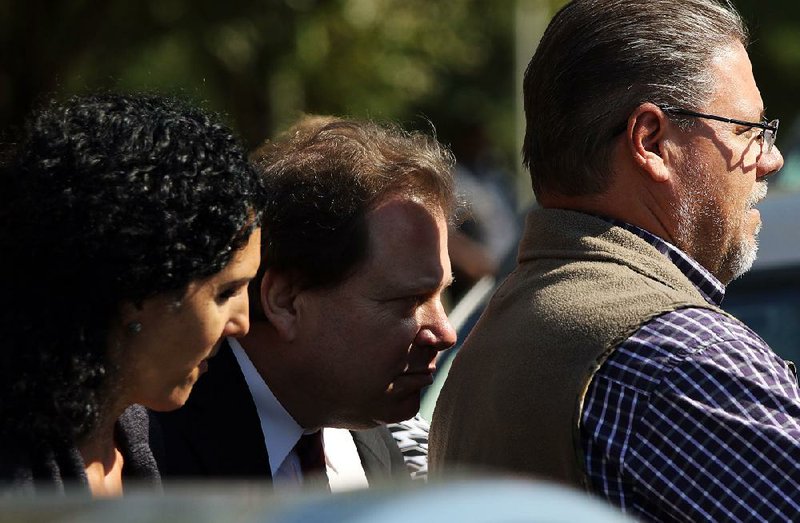Ted Suhl, a northeast Arkansas businessman convicted in July of bribing a state official to benefit his businesses, won't be allowed to remain free while appealing.
In an order signed Monday, U.S. District Judge Billy Roy Wilson denied Suhl's request to avoid reporting to federal prison by 2 p.m. Jan. 2 while he challenges his bribery and wire fraud convictions, as well as the seven-year sentence and $200,000 fine that Wilson imposed Oct. 27.
Wilson's written order was brief, summing up all four issues that Suhl contended were "close questions" for an appellate court by saying, "I have ruled on each point ... and I am satisfied that those rulings were correct."
After a weeklong trial in July, a federal jury convicted Suhl, 51, of Warm Springs of four of six charges he faced: two counts of honest services wire fraud and single counts of interstate travel in aid of bribery, and bribery involving federal program funds. The jury acquitted Suhl of a bribery conspiracy charge and another count of honest services wire fraud.
Jurors found that Suhl, a self-described evangelical Christian who has estimated his net worth at over $5 million, paid Steven Jones, then the deputy director of the state Department of Human Services, $10,000 to $20,000 in cash bribes between April 2007 and mid-September 2011.
Although Jones testified that he didn't perform any specific "official acts" at Suhl's request, he conceded that by accepting cash through a middleman, he led Suhl to believe he was essentially "on retainer" to share any important inside information that would affect Suhl's behavioral health care companies for youths.
Jones is serving a 2½-year sentence for his guilty plea to a charge of accepting a bribe.
Two of Suhl's businesses, Maxus Inc. and Trinity Behavioral Health, received $125 million altogether in state Medicaid funds through the department during the 4-year period. Prosecutors said Suhl wanted to protect or increase that steady source of income by giving cash disguised as church donations to Jones through a middleman and a West Memphis church.
In his motion to allow Suhl to remain free pending appeal to the 8th U.S. Circuit Court of Appeals, defense attorney Robert Cary of Washington, D.C., argued that Suhl's conviction is likely to be overturned, so it would be unfair to imprison him until the appeal is decided.
Cary cited four "substantial questions of law or fact" that he said tip the appeal in Suhl's favor: the exclusion of a "quid pro quo" requirement in jury instructions; insufficient evidence that Suhl sought or received any "official acts" from Jones; the judge's refusal to allow the cross-examination of a key government witness about an unrelated matter that the defense said reflected on the witness' credibility; and Wilson's refusal to allow Suhl to present his primary defense -- that his contributions to the 15th Street Church of God in Christ were part of a pattern of religious giving over many years.
In opposing the request to put Suhl's prison report date on hold, John Keller, an attorney with the U.S. Justice Department, wrote that the "errors" cited by Suhl weren't likely to result in his conviction being overturned. Keller also argued that under federal law, a defendant who has been sentenced to prison must be detained unless he can show that he isn't likely to flee or endanger the community while free and that a reversal is likely.
Wilson cited that legal requirement, noting that only the second issue -- concerning whether an appeal is likely to result in a reversal -- applies in Suhl's case.
The Justice Department stepped in to prosecute the Suhl case after the local U.S. attorney's office said it lacked adequate resources to investigate and prosecute the case. The department said an FBI investigation into Suhl's activities lasted several years because it branched off into several separate investigations.
Metro on 11/16/2016

